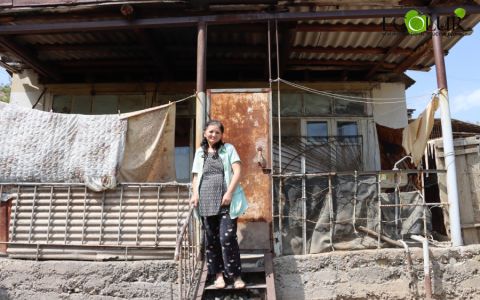Residents of Armenian village oppose construction of an open mine
Over 200 residents of Gndevaz village, Armenia, signed a letter of complaint to the IFC Ombudsman's office (IFW is a member of World Bank Group) demanding to stop the funding of Amulsar open pit mining project (implemented by Geoteam Copany) and the construction of a heap leach facility. The villagers point out unclear decision making and possible hazard of the mine. In their letter they write: „During Amulsar mine development the explosions will result in spreading the dust of heavy metals over the lands, pastures and fields of the village, as well as over the residential area of the village. As independent experts assure, the radioactive background will also boost… We are demanding from IFC to stop the funding of this illegal project, as it poses great hazards for the population of Gndevaz. We are demanding to take our opinion into consideration and not to violate our rights.“
Full letter in English: http://ecolur.org/en/news/mining/sensational-statement-over-200-gndevaz-villagers-demanding-to-stop-amulsar-project/6458/
Video promoting awareness on chemicals in products
EUCHemicals released a video promoting benefits of REACH, as well as the consumer's right to know about hazardous chemicals contained in products they purchase. The footage shows a man scanning the aisles of a supermarket. At the checkout he is presented with a long receipt, which contains names of substances in the products he has purchased. You can watch the video online in 23 languages: https://www.youtube.com/watch?v=WSWIAEDJfSg
The video raised attention of chemical industry: “It is unbalanced, alarmist and implies all products contain dangerous chemicals. It also signally fails to acknowledge any benefits of chemicals, or recognise any aspects of the EU consumer protection legislative controls effectively limiting exposure,” says Peter Newport, CEO of the CBA.
More in English: https://chemicalwatch.com/20439/echa-consumer-rights-video-alarmist-says-industry-association
Saicm identifies 12 elements of sound chemicals management
Countries participating in regional meetings of the Strategic Approach to International Chemicals Management (SAICM) have identified 12 “basic elements” that are required to achieve sound chemicals management at national level. The activities may provide a focus for countries, as they work towards the 2020 goal of minimising the adverse effects of chemicals on health and the environment. The elements are: legal frameworks that manage the lifecycle of chemicals; enforcement and compliance mechanisms; implementation of existing international chemicals conventions; strong institutional systems, including engagement, coordination and co-operation among all relevant actors; collection, management and sharing of data and information, relevant to the sound management of chemicals among all relevant stakeholders; industry participation and responsibility; implementation of the Globally Harmonized System (GHS) of classification and labelling of chemicals; inclusion of chemicals in national development plans – also known as mainstreaming; chemical risk assessment through use of best practices; systems for sharing information, including hazard, risk, occupational health, research and monitoring, and training; capacity to deal with poisonings and other chemicals incidents; and monitoring of the impacts of chemicals on health and the environment.
The 12 basic elements are included in a document covering overall orientation, guidance and recommendations, which has been compiled ahead of ICCM4, along with a second report on progress in Saicm implementation from 2011-13.
More in English: http://chemicalwatch.com/20648/saicm-identifies-12-elements-of-sound-chemicals-management
New system to detect mercury in water systems
A new ultra-sensitive, low-cost and portable system for detecting mercury in environmental water has been developed by
More in English: http://www.adelaide.edu.au/news/news71882.html
Swiss NGO finds 175 chemicals of concern in food packaging
A total of 175 chemicals with known hazardous properties are legally used in food packaging in the EU and the
Further Information: TEDX list
Joint FAO/WHO Meeting on Pesticide Residues (JMPR)
The Joint Meeting on Pesticide Residues (JMPR) is an expert ad hoc body administered jointly by the UN Food and Agriculture Organization (FAO) and the World Health Organization (WHO), which harmonizes the requirement and the risk assessment on the pesticide residues. The Committee invites submissions of information on substances that will be evaluated at future meetings as described in its requests for data. The list of substances to be evaluated is based on recommendations of the Codex Committee on Pesticide Residues (CCPR), previous Expert Meetings, and direct requests from governments, other interested organizations, and producers of substances that have been evaluated previously.
dates: 16-25 September 2014 location: Rome, Lazio, Italy contact: Philippe Verger phone: +41-22-791-4807 fax: +41-22-791-3053 e-mail:This email address is being protected from spambots. You need JavaScript enabled to view it.







